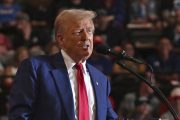
The ADP/Moody’s jobs report released on Wednesday showed job growth 50-percent ahead of Wall Street’s expectations: 298,000 jobs were created in February versus expectations of less than 200,000 by economists polled by the Wall Street Journal. The job growth was all across the spectrum, with construction and manufacturing sectors adding 106,000 new jobs.
The report, sponsored by ADP, a human resources management company with more than 400,000 business clients, and aided by Moody’s Analytics, was based on performance reported during the month to both entities. Mark Zandi, Moody’s chief economist, commented on the remarkable February numbers:
Powering job growth were the construction, mining and manufacturing industries. But near record-high job openings and record-low layoffs underpin the entire job market.
Zandi thought improved confidence might have something to do with the blowout numbers:
Confidence is playing a large role. Businesses are anticipating a lot of good stuff — tax cuts, less regulation. They are hiring more aggressively.
{modulepos inner_text_ad}
Ahu Yildirmaz, an ADP vice president, was astonished at the numbers: “February proved to be an incredibly strong month for employment, with increases we have not seen in years.” Indeed, the ADP/Moody’s report revised January’s numbers from 246,000 new jobs to a more accurate 261,000. That’s 560,000 new jobs in just the first two months of the year which, if maintained, will add more than three million new jobs in 2017.
The same day that the ADP report came out, LinkedIn’s Workforce Report noted that, taken together, January and February were the strongest consecutive months for hiring since August and September of 2015.
LinkedIn added a note of caution: “Two months don’t make a trend, but it seems like the stronger hiring is being driven by elevated business confidence due to the new administration’s promises to lower taxes and reduce regulations. It’s unclear if this trend is sustainable, or merely a temporary blip on the radar, but we’re keeping an eye on it.”
Those Wall Street economists who missed the mark with the ADP report are readjusting their outlooks for Friday’s Labor Department jobs report. Last month the department’s Bureau of Labor Statistics (BLS) reported growth in January of 227,000 new jobs.
Missing from most of the conversation and consternation was the potential impact the president himself is having on the jobs numbers and the economy in general. No one seems interested in talking about the uptick in consumer confidence, or in Trump’s leadership qualities filtering through from his actions to date. The final results of February’s Consumer Confidence Survey conducted by the University of Michigan showed its Index of Consumer Sentiment jumping 5.0 percent year-over-year, its Current Economic Conditions index rising 4.4 percent YOY, and its Index of Consumer Expectations increasing by 5.6 percent. Said University of Michigan’s chief economist, Richard Curtin: “While consumer confidence edged upward in late February, it remained slightly below the decade peak recorded in January. Overall, the Sentiment Index has been higher during the past three months than any time since March 2004.” (Emphases added.)
Is it possible that these remarkable increases in consumer sentiment and job growth are happening in a vacuum? Not according to Jessica Stillman, who reviewed the results of a study undertaken by Tel Aviv University’s Faculty of Management: “If you want exceptional results, forget cracking the whip and running down your team for being less than stellar.… High expectations of employees leads to improved performance.” Professor Eden of the faculty said it’s all about the leader:
If a leader has high expectations … it means that he or she will have a three times greater chance of being above average.
Additional proof of the power of a strong leader was provided by Joan Lloyd & Associates, which outlined the particular strengths of outstanding leaders:
They believe in themselves and have confidence in what they are doing.
They hold a strong belief in their ability to develop talents of their employees … being careful to select only those subordinates they “know” will succeed.
They have the ability to communicate to their subordinates that their expectations are realistic and achievable.
They believe that [their] subordinates can learn to make decisions and to take the initiative [and] they encourage this behavior.
They prefer the rewards that come from the success … of their subordinates.
Because these leadership qualities were evident in Trump even during the short span between the election and now, something called the “Trump Effect” is taking hold not only in the United States but, as the New York Times reluctantly admitted, around the world as well:
Call it the Trump Effect. Around the world, his election is already shaping events.… Companies hoping to profit from Mr. Trump’s economic policies have seen [the prices of] their shares soar.… Governments are recalibrating [their] policies on trade, defense and immigration.
Expectations always precede performance. High expectations precede high performance. The economy, under siege for so long, is just now catching its breath. President Donald Trump fully intends to “make America great again.”
An Ivy League graduate and former investment advisor, Bob is a regular contributor to The New American magazine and blogs frequently at LightFromTheRight.com, primarily on economics and politics. He can be reached at [email protected].



